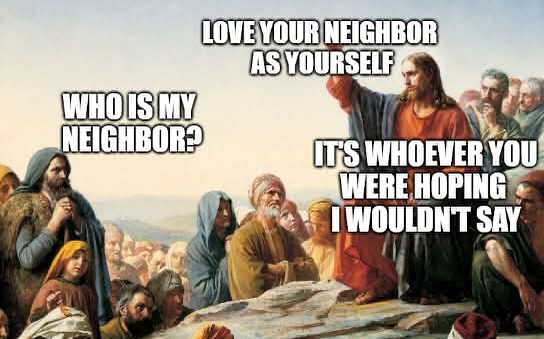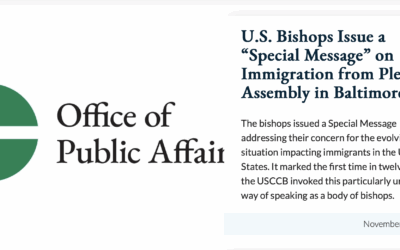One Saturday morning, I came upon a collage of pictures of smiling men in striped jump suits in my social media feed. There was such joy in the pictures! My heart was immediately warmed to these men, leading me to read the text of the post. The men had undergone a pilot program at our county jail. It was an 8-week emotional awareness program that, essentially, taught them to better control their emotions and impulses. The beaming men held up their certificates for the camera, were obviously proud of what they’d accomplished and it really showed in the photographs. It was such a nice, uplifting moment of humanity and it blew a wind of fresh optimism into my day. That is, until I started reading the comments.
The first comment I read: “I wish I could see Justin Miller* smile as big as his murderer is smiling.”
The wind of optimism left in a gale of foreboding as my gaze went from the smiling faces down to their striped jump suits. These men were in the county lock-up for a reason and it probably wasn’t just to take emotional awareness classes.
And so, not wanting to insulate myself from the darker capabilities of man, I started looking up news stories on what each of the pictured men had done. I’m sorry to say that many of them had been accused of committing very heinous crimes. A couple of them… stomach churning stuff that involved very young children. I can assure the reader that the glimpse of good the smiling pictures had given me was now being tempered and over-shadowed by the evil I was reading in the news stories and seeing in the mug shots.
This was difficult for me to process because though I now knew what monsters they were, I had seen their humanity first. I had gotten a peek at that little something inside them that, though dim, was still present. The little something that God sees when He looks at them. The little something that He sees in each of us. The little something that makes Him loves us and that makes Him want us to return home to Him despite whatever it is we have done.
Saint Paul wrote, “Why, one will hardly die for a righteous man – though perhaps for a good man one will dare even to die. But God shows his love for us in that while we were yet sinners Christ died for us.” (Romans 5:7-8). I now had before me the darkest extremity of which Saint Paul was talking about. We’ve become so inured to the word “sinners,” we don’t often think of exactly all that the word might entail. At the most we might think of the bad things we’ve done perhaps even the bad things that those around us have been capable of. But how many of us sit around and really think about the fact that the most depraved and degenerate humans are included in the word “sinners” and that Christ died for them too. He wants them to be saved too.
I thought about it at Mass the following day, almost unable to comprehend it. Looking at the crucifix –of Christ tortured, bloodied, killed in the most horrendous of ways for all of us– which I had always meditated about in terms of my own sinful self. But for the first time I consciously thought about what all of us meant. It meant His sacrifice included these men who had done the unspeakable. In the Garden of Gethsemane, He had taken on their horrible acts as well as mine. He loved each of them as uniquely as He loved any of His saints. Fittingly, the Gospel reading that Sunday was the parable of the Good Samaritan (Luke 10:25-37).
A scholar asked Jesus what he must do to inherit eternal life. Jesus asked him what is written in the law? The scholar replied that we must love God with all our hearts and to love our neighbors.
“And who is my neighbor?” the scholar of the law asked. Jesus proceeded to tell him about the man who fell victim to robbers on a dangerous road. He was left stripped, beaten and half-dead. Two fellow Jews saw him, but didn’t stop to help. A Samaritan stopped and was so moved by compassion that he treated and bandaged the man’s wounds and brought him to an inn to make sure he was further cared for. It’s important to know that the Jews and Samaritans were mortal enemies and that they hated each other. And yet, despite hating him, the Samaritan was able to see the humanity of the man lying there and have compassion.
I thought of the prisoners and their horrible, horrible crimes. How I am I to love neighbors such as these?
I could start to perceive a path when I read the day’s reflection by Ronda Chervin. “But if we fall in love with Christ, then He becomes our center. …We soon realize that all people are viewed by Him with love. He sees their unlovable qualities, and knows that they can be converted into lovable ones. Would He have created them if He did not love them?”
I knew nothing about these men. I was born into a loving family and had a relatively pleasant and safe childhood. These men may have been born into situations that even the devil wouldn’t have wished on anyone. Couple that with growing up in our increasingly hedonistic culture, they may have stood little chance. I’m not excusing the things they did, only trying to keep in mind that their actions did not come out of a vacuum. Dr. Ray Guarendi used to do prison ministry and once said, after hearing some of the life stories of the criminals before him, he couldn’t be sure he wouldn’t have wound up in the exact same place as they did if he’d had to endure what they’d endured.
Before I found out all that was unlovable about these men, I saw a glimpse of the lovable. I got just a peek of what it is inside of them that God is trying to save. I saw why He would go through all the trouble to convert the unlovable qualities. And I understood why it is just best to leave eternal judgement up to God, in that He has the whole picture of why each man is what he is whereas we humans only ever have a few pieces of the picture.
These men should be justly punished for the crimes they’ve committed. They did evil things and must now pay the price. But they are still men, made in the image and likeness of God. There is something in them that has value. Ronda Chervin writes that to God, they are still unique and worthy of being. And though the crimes some of these men committed makes them completely undeserving of anyone’s mercy, it is exactly mercy that the Our Lord asks us to extend.
“Which of these three, in your opinion, was neighbor to the robbers’ victim?” Christ asked the scholar.
The scholar answered, “The one who treated him with mercy.”
Jesus said to him, “Go and do likewise.”
These men may not have been physically beaten and robbed and left for dead on the side of the road, but one could argue that they had been beaten, robbed and left for dead spiritually. It is unfair that these men get to smile big while their victims are no longer able to, but the Lord has asked us to extend mercy. Maybe sometimes that means treating even the most vile amongst us as a human being despite their not deserving it. Maybe it is helping the worst of humanity see that they don’t have to be the worst – there are other options. Maybe it is getting our hearts to a place to where we can will the good of these men because as wretched as they are and as much as they have abused the free will given to them, God created them and He loves them. It’s in their smile.
*name changed for privacy





0 Comments